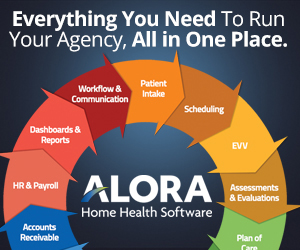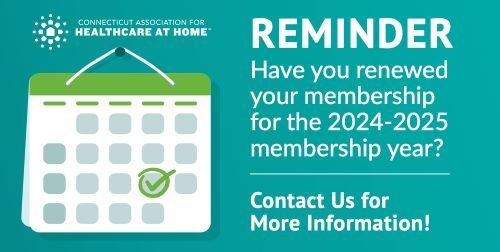 |
||||||||||||||||
| May 30, 2024 | ||||||||||||||||
Source: McKnight’s Home Care, May 22, 2024
To protect themselves against the Centers for Medicare & Medicaid Services’ compliance enforcement mechanisms, home care providers must focus on quality assessment and performance improvement (QAPI) programs, experts at the National Association for Home Care & Hospice said during a webinar Tuesday.
“It’s very, very important that you spend the resources necessary to develop your QAPI program,” Wehri said.
Earlier this month, the Centers for Medicare & Medicaid Services released updates to its enforcement remedies and alternative sanctions for home health and hospice agencies. These remedies and sanctions may be imposed in lieu of termination for providers with condition-level deficiencies. They include civil money penalties, payment suspensions, temporarily-appointed management, directed plans of correction or in-service training.
Source: Home Health Care News, May 22, 2024
A new study of Medicare Advantage (MA) beneficiaries found that in-home companion care reduced care costs by close to 10%.
The study — conducted by a national actuarial firm and commissioned by the companion care company Papa — also found that in-home companion care boosted home health utilization among MA members, while reducing more costly care. Specifically, Papa was able to reduce health care costs by 9% among MA beneficiaries on behalf of health plans.
“As Medicare Advantage organizations face rising health care costs, slimmer margins and mounting regulatory pressures, they need to to show value for every dollar spent,” Kelsey McNamara, head of research and impact at Papa, told Home Health Care News in an email. “And with CMS’ ramp up of supplemental benefit scrutiny and data collection, there’s heightened interest in solutions that reduce costs, improve utilization and help members seek and remain in lower-acuity care settings for longer. Today’s results affirm Papa’s ability to do just this.”
Source: Home Health Care News
When news of the Change Healthcare cyberattack became public, it rocked the broader health care sector. Months later, it serves as a major lesson for home-based care providers.
In February, Change Healthcare — the largest U.S. billing and payment system in the country, and a subsidiary of UnitedHealth Group (NYSE: UNH) — was brought to a screeching halt as the result of a cyberattack.
Change Healthcare works with payers, providers and patients — delivering revenue and overseeing payment cycle management. The ransomware attack made it difficult for thousands of providers to bill, significantly impacting cash flows in the process.
UnitedHealth Group would go on to pay the cyber hackers roughly $22 million, according to reports from WIRED.
In March, UnitedHealth Group rolled out a Temporary Assistance Funding Program for providers.
During the same month, Senator Mark Warner (D-Va.) introduced the Health Care Cybersecurity Improvement Act of 2024. The legislation gives providers financial incentive to keep up with cybersecurity standards.
Source: Decision Health
An update to the language found under M0030 (Start of Care Date) was included in the draft version of the OASIS-E1 instrument, released earlier this month. OASIS-E1 is set to take effect Jan. 1, 2025.
The updated guidance addresses agencies whose policies require an RN to perform the non-billable nursing assessment for therapy-only cases.
Under the guidance for this item, CMS plans to add: When the agency’s policy/practice is for an RN to perform the SOC assessment in a therapy-only case and the therapist’s first visit is the start of care date (i.e., the first billable visit), the non-billable nursing assessment visit must be made the same day or within five days after the therapist’s first visit.
While this is not new guidance itself, it will be a new addition to the OASIS-E1 guidance manual.
There are currently no states that require agencies to have an RN perform the assessment and it is not a policy that is commonly seen anymore, notes Cindy Krafft, co-owner and founder of K&K Solutions of Fernandina Beach, Fla.
“I have never understood why agencies would provide a nursing visit that will not be paid for to do this,” Krafft says. “Therapists with proper training are fully capable of completing this.”
And for those agencies looking to change this policy, it could be as simple as updating any policy/procedure related to the SOC to include both nursing and therapy available to conduct the OASIS, Krafft advises.
For more on the new OASIS-E1 draft guidance manual, see here.
Source: Decision Health
CMS has refined its signature requirements for prior authorization and medical review processes, but these changes won’t address some of the common mistakes agencies make when it comes to physicians appropriately signing and dating the plan of care (POC) and certification.
Effective June 10, the update aligns electronic signature requirements with written ones. It also clarifies that an addendum cannot correct items that agencies included on a submitted bill.
The key takeaway is that the date and author of all amendments to the POC must be clearly indicated, says Joe Osentoski, senior consultant for Gateway Home Health Consulting in Madison Heights, Mich.
“There must be an identifiable trail to see who changed what when so that authorship and authentication of documents is maintained,” he says.
Source: NAHC, May 28, 2024
The National Association for Home Care & Hospice (NAHC) applauds the introduction in the United States Senate of the Hospital Inpatient Services Modernization Act of 2024, bipartisan legislation sponsored by Sen. Thomas Carper (D-De) and Sen. Tim Scott (R-SC) to extend the Centers for Medicare & Medicaid Services (CMS) Acute Hospital Care at Home waiver program for five years.
The Acute Hospital Care at Home waiver program is due to expire on Dec.31, 2024, but this legislation would extend it for five additional years.
The hospital at home waiver program has been an impressive success, improving patient outcomes, lowering costs, and reducing the burden on hospitals. The vast majority of Americans prefer to age in place, in their own homes and communities, and the hospital at home program enables providers to deliver hospital-level care to Medicare beneficiaries in the comfort of their own homes.
|
||||||||||||||||
| Past Issues | Subscribe | cthealthcareathome.org | Advertise with Us | ||||||||||||||||





